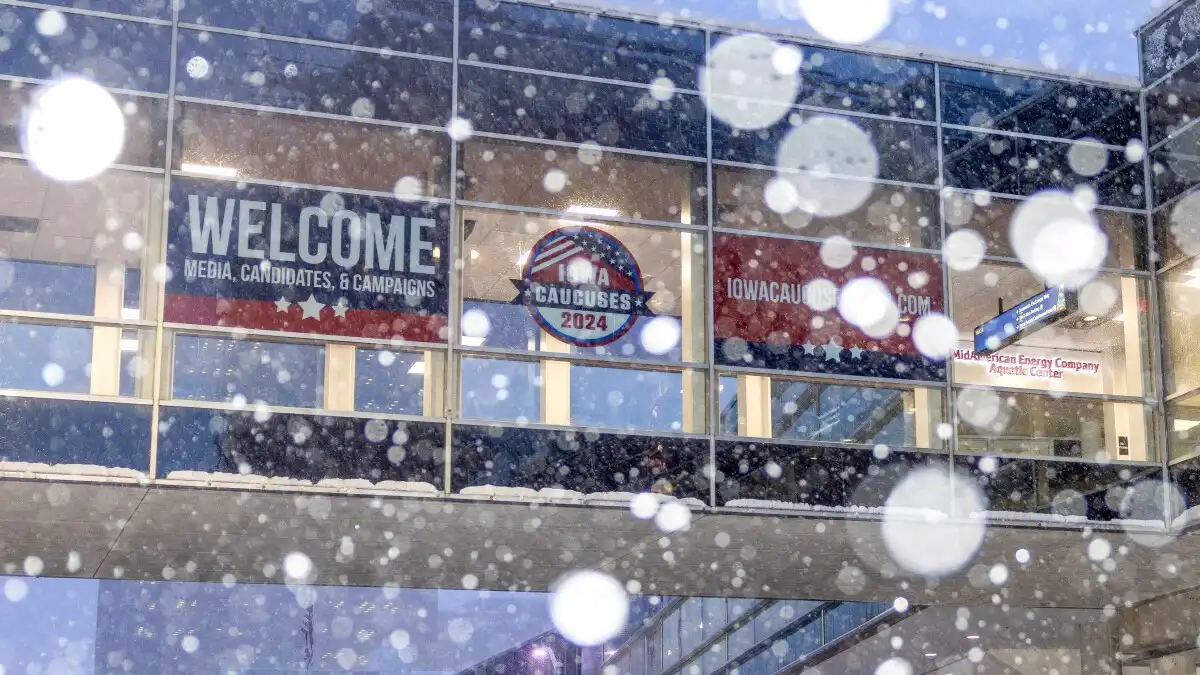Iowa caucuses and MLK Day: Up First briefing
Iowa Republicans kick off 2024 election season with first caucuses. Israel, Gaza mark 100 days of war. Martin Luther King Jr. Day.
Good morning! Welcome to the Up First newsletter. If you enjoy the content, subscribe here to get it delivered to your inbox, and don't forget to listen to the Up First podcast for all the news you need to start your day.
Tonight, Iowa Republicans are kicking off the 2024 election season as they hold the first caucuses to nominate a presidential candidate. Donald Trump is the clear favorite, but his rivals have been campaigning hard -- even as temperatures plunge below zero. Here's how the first-in-the-nation caucuses work and why they're so significant.
This weekend marked 100 days of war for people in Israel, Gaza, and around the world following the Oct. 7 Hamas attack that killed more than 1,200 people in Israel, according to the nation's government. Gaza's Ministry says more than 24,000 people in Gaza -- mostly women and children -- have been killed by Israel's military response to the attacks.
This year, the Iowa caucuses fall on a national holiday: Martin Luther King Jr. Day. For 2024, Americans are honoring the civil rights leader on his actual birthday. He would have been 95. Here are a few things to know about why we celebrate this holiday.
This essay was written by Steve Inskeep. He joined NPR in 1996 and started hosting Morning Edition in 2004. He also hosts Up First.
In 2008, Michele Norris approached Steve with an idea. They should gather a mixed-race group of voters and interview them about that year's presidential election, which Barack Obama was on his way to winning.
Michele proposed encouraging frank discussions by serving dinner first and then talking for hours and hours. She thought food improved conversation. Looking back, Steve realizes she told him this while they were in a restaurant. She was recruiting him for the project while taking him to lunch.
The resulting York Project traced voter attitudes and fears in a historic year -- and launched Michele on a new path. Many people thought Obama's election heralded a post-racial America. She didn't think so. Eventually, she founded the Race Card Project, which encouraged people to tell their stories about race and identity in six words. She left NPR as she pursued this.
Now, she's collected more than a decade of six-word stories and follow-up interviews, which she views as a special record of our era. In today's interview about her book Our Hidden Conversations, she compares the stories to "dendrochronology, the study of tree rings." When you cut down a tree, the rings in the trunk -- one from each year -- will tell a story of floods and droughts, fires or human disturbances and chemicals in the soil. "The tree will tell a story, and the tree never lies."
In a tumultuous era, she told us, "This archive of human experience is a social tree ring."
Sandhya Dirks is a national correspondent covering race and identity for NPR. She approaches race and equity not as a beat but as a fundamental lens for all investigative and explanatory reporting. Dirks shares some NPR reporting to read, listen and reflect on for MLK Day.
There's one MLK quote you'll hear when a group or politician is going after diversity but couching it in the language of civil rights: "I have a dream that my four little children will one day live in a nation where they will not be judged by the color of their skin but by the content of their character.
"This quote gets appropriated to push for a color blindness that willfully rejects the realities of systemic racism. This piece by my colleague Adrian Florido looks at the attempt to dilute King's legacy and words -- something important to remember today. This must-listen episode of Code Switch does the same.
School districts face increasing threats nationwide to limit or suppress teaching the facts of systemic racism and Black history. Sandhya spoke with high school students in the Southern California suburb of Temecula on what it's like living with bans on "critical race theory" and "divisive topics," which effectively silence talking about race. It turns out the bans increase students' experiences of racism. Adrian has a powerful story chronicling how Black teachers in Oklahoma find ways to fill in gaps with facts and wisdom.
On a recent visit to Memphis, Tenn., Sandhya saw the Lorraine Motel, the site of King's assassination, in real life. It was powerful. The sense of profound loss is still raw decades later.
On this trip, she listened to a podcast called The Sum of Us, hosted by Heather McGhee, who spoke to NPR about her book of the same name. The 2022 Memphis episode describes what it's like to encounter this hallowed ground and focuses on a then-mostly unknown local activist named Justin Pearson.
Pearson is no longer unknown. Last year, he was one of two young Black legislators expelled by the white, Republican majority in the Tennessee legislature. Before he was expelled (and then reinstated and reelected), he gave a rousing speech about democracy and race that reminded many not just of how civil rights era battles are still being fought but how new leaders are emerging to carry on King's legacy.











Comments on Iowa caucuses and MLK Day: Up First briefing